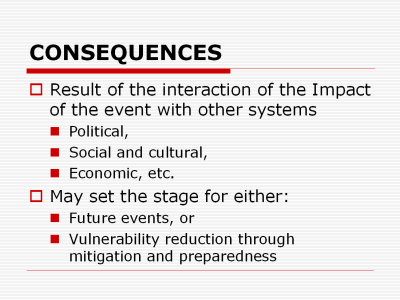 |
Consequences have been defined in a number of
ways. For example, in the development of doctrine for response to terrorism
incidents in the United States in the late 1990s, law enforcement response
was designated crisis management, and emergency services response was
designated consequence management, a separation that was driven by cultural
factors in law enforcement agencies, not by the reality of the event. In
other cases, consequence has been used synonymously with impact. I believe
that it is more accurate to view consequences as outcome of the interaction
of the impact with how humans perceive and react to the event. Ineffective
or dysfunctional interaction may allow more events of a similar nature to
occur; effective courses of action may result in mitigation and preparedness
programs that reduce vulnerability to future events. |
